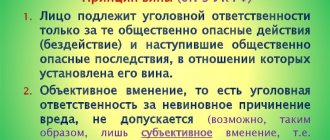Commentary to Art. 8 of the Criminal Code
1. The corpus delicti is a set of objective and subjective characteristics provided for by criminal law that characterize a socially dangerous act as a crime. Its presence in a specific socially dangerous act serves as a necessary and sufficient basis for bringing to criminal responsibility the person who committed this act.
2. The signs that form the corpus delicti are grouped according to the elements of the crime. In total, the crime consists of four elements: 1) the object of the crime; 2) the objective side of the crime; 3) the subjective side of the crime and 4) the subject of the crime.
3. The object of the crime is those social relations protected by criminal law that the crime encroaches on.
4. The objective side means the external manifestation of the crime in reality. It includes the following features: an act, socially dangerous consequences, a causal relationship between the act and its socially dangerous consequences, time, place, setting, method, instruments and means of committing a crime.
5. The subjective side of a crime is understood as the mental activity of a person directly related to the commission of a crime. The content of the subjective side of the crime is characterized by such legal features as guilt, motive and purpose.
6. The subject of a crime is a person who has committed a criminal offense and, in accordance with the law, is capable of bearing criminal liability for it.
Article 8. Grounds for criminal liability
Determination of the Constitutional Court of the Russian Federation dated September 27, 2019 N 2274-O The above norms not only do not violate the rights and legitimate interests of a person convicted of committing a crime, but, on the contrary, are a guarantee of imposing criminal liability only if all the elements of a crime provided for by criminal law are present (Article of the Criminal Code of the Russian Federation), and do not contain uncertainty or any exceptions from the procedure for evidence established by the criminal procedural law in criminal cases, and therefore cannot be regarded as violating the rights of A.A. Antonov in the aspect he indicated, which is why his complaint, as not meeting the criterion of admissibility of appeals to the Constitutional Court of the Russian Federation, cannot be accepted by the Constitutional Court of the Russian Federation for consideration.
Determination of the Constitutional Court of the Russian Federation dated September 27, 2019 N 2374-O
At the same time, an indication of the illegal nature of specific acts in the sphere of circulation of certain objects, substances, etc., characteristic of the blanket dispositions of articles of the criminal law, means that the legal prerequisite for the application of the relevant criminal law norms is non-compliance with the rules established in this area, despite the fact that the basis for criminal liability - by virtue of an article of the Criminal Code of the Russian Federation - is the presence in the committed act of all the elements of a crime provided for by this Code (Resolution of the Constitutional Court of the Russian Federation of July 16, 2015 N 22-P).
Resolution of the Presidium of the Supreme Court of the Russian Federation dated December 5, 2018 N 126P18
By virtue of Art. According to the Criminal Code of the Russian Federation, the basis for criminal liability is the commission of an act containing all the elements of a crime provided for by this Code. Article 159 of the Criminal Code of the Russian Federation defines fraud as the theft of someone else's property or the acquisition of rights to someone else's property through deception or abuse of trust.
Determination of the Constitutional Court of the Russian Federation dated March 26, 2019 N 648-O
Article 161 of the Criminal Code of the Russian Federation, which provides for liability for robbery, i.e., is also aimed at achieving these goals. open theft of someone else's property - an unlawful gratuitous seizure of someone else's property for the benefit of the perpetrator or other persons, committed for mercenary purposes, causing damage to the owner or other possessor of this property (clause 1 of the notes to Article 158 of this Code), as well as Article 73 of this Code, which establishes that If, having imposed correctional labor, restrictions on military service, detention in a disciplinary military unit or imprisonment for a term of up to eight years, the court comes to the conclusion that it is possible to correct the convicted person without actually serving the sentence, it decides to consider the imposed punishment suspended. In this case, a person is subject to criminal liability only for those socially dangerous actions (inaction) and socially dangerous consequences in respect of which his guilt is established, and the basis for such liability is the commission of an act containing all the elements of a crime provided for by this Code, and the perpetrator is given a fair punishment punishment within the limits provided for by the relevant article of the Special Part of this Code, and taking into account the provisions of its General Part, taking into account the nature and degree of public danger of the crime and the identity of the perpetrator, including circumstances mitigating and aggravating the punishment, as well as the impact of the imposed punishment on correction the convicted person and the living conditions of his family (articles , , and of the Criminal Code of the Russian Federation). Relevant issues must be resolved by the court when rendering a sentence.
Determination of the Constitutional Court of the Russian Federation dated May 29, 2019 N 1239-O
According to the article of the Criminal Code of the Russian Federation, the basis of criminal liability is the commission of an act containing all the elements of a crime provided for by this Code. Consequently, when qualifying an act, including under Article 163 of the Criminal Code of the Russian Federation, it is necessary to establish both objective and subjective elements of the crime (Definition of the Constitutional Court of the Russian Federation of May 25, 2021 N 1013-O).
Determination of the Constitutional Court of the Russian Federation dated May 25, 2017 N 1013-O
According to the article of the Criminal Code of the Russian Federation, the basis of criminal liability is the commission of an act containing all the elements of a crime provided for by this Code. Consequently, when qualifying an act, including under Article 163 of the Criminal Code of the Russian Federation, it is necessary to establish both objective and subjective elements of the crime. In this case, the explanations given by the Plenum of the Supreme Court of the Russian Federation in the Resolution of December 17, 2015 N “On judicial practice in cases of extortion (Article 163 of the Criminal Code of the Russian Federation)”, which draws the attention of the courts to the fact that under the information, disgracing the victim or his relatives, one should understand information that discredits their honor, dignity or undermines their reputation (for example, information about the commission of an offense, an immoral act); in this case, it does not matter whether the information under the threat of dissemination of which extortion is committed is true; other information, the dissemination of which may cause significant harm to the rights or legitimate interests of the victim or his relatives, includes, in particular, any information constituting a secret protected by law; dissemination during extortion of knowingly false information discrediting the honor and dignity of the victim and (or) his relatives or undermining his (their) reputation, illegal dissemination of information about the private life of a person that constitutes his personal or family secret, disclosure of the secret of adoption against his will adoptive parent, illegal disclosure of information constituting commercial, tax or banking secrets, form a set of crimes provided for in the relevant parts of Articles 128.1, 137, 155 or 183 and Article 163 of the Criminal Code of the Russian Federation (clause 12); if the demand for the transfer of property or the right to property or the commission of other actions of a property nature is lawful, but is accompanied by the threat specified in part one of Article 163 of the Criminal Code of the Russian Federation, then such actions do not entail criminal liability for extortion (clause 13).
Determination of the Constitutional Court of the Russian Federation dated September 28, 2017 N 2170-O
According to the article of the Criminal Code of the Russian Federation, the basis of criminal liability is the commission of an act containing all the elements of a crime provided for by this Code. Consequently, it is necessary to establish both objective and subjective elements of a crime when qualifying an act, including under Article 160 of the Criminal Code of the Russian Federation, which provides for liability only for such an act that causes damage to the owner or other owner, which is committed with selfish purpose and intent, aimed at taking possession of property (its appropriation) or alienation of property (its embezzlement). Illegal gratuitous circulation of property entrusted to a person for one’s own benefit or for the benefit of other persons, causing damage to the owner or other legal owner of this property, must be qualified as misappropriation or embezzlement, provided that the stolen property was in the lawful possession or control of this person, who, by virtue of official or other official position, contract or special assignment exercised powers to dispose, manage, deliver, use or store in relation to someone else’s property (rulings of the Constitutional Court of the Russian Federation dated June 21, 2011 N 851-О-О, dated May 28, 2013 N 707-O, dated December 23, 2014 N 2829-O, dated March 29, 2021 N 640-O, etc.); at the same time, the possibility of bringing to criminal liability persons who carry out lawful civil transactions is not assumed (Determination of the Constitutional Court of the Russian Federation of July 2, 2009 N 1037-О-О).
Determination of the Constitutional Court of the Russian Federation dated October 26, 2017 N 2257-O
2.2. The basis for criminal liability is, according to an article of the Criminal Code of the Russian Federation, the commission of an act containing all the elements of a crime provided for by this Code. The socially dangerous consequences of the crime committed - depending on the design of its composition: material or formal - may or may not be included among its mandatory features (Resolution of the Constitutional Court of the Russian Federation of April 7, 2015 N 7-P). At the same time, the absence of indications of such consequences in the disposition of the corresponding article of the Special Part of this Code as an element of the crime envisaged by it does not mean that the commission of this crime does not entail causing harm or a real threat of causing it. In the Russian legal system, a crime - unlike other offenses - is characterized by a criminal social danger, in the absence of which even an act that formally falls under the criteria of a criminal offense cannot be considered as such due to its insignificance (part two of Article of the Criminal Code of the Russian Federation).
Determination of the Constitutional Court of the Russian Federation dated December 19, 2017 N 2895-O
According to the article of the Criminal Code of the Russian Federation, the basis of criminal liability is the commission of an act containing all the elements of a crime provided for by this Code. This legal provision is a norm of the General Part of the Criminal Law, is subject to interrelation with the provisions of its Special Part, including the provisions of Article 159 of the Criminal Code of the Russian Federation, does not contain any uncertainty and cannot be regarded as violating the rights of the applicant.
Determination of the Constitutional Court of the Russian Federation dated January 30, 2020 N 240-O
As for the contested K.V. Vagin of Articles , and 290 of the Criminal Code of the Russian Federation, then, contrary to paragraph 2 of Article 97 of the Federal Constitutional Law “On the Constitutional Court of the Russian Federation,” the presented documents do not confirm the completion of the criminal proceedings against him.
Determination of the Constitutional Court of the Russian Federation dated January 30, 2020 N 212-O
Contested A.P. Bautina’s norms not only do not violate the rights and legitimate interests of a person convicted of committing a crime, but, on the contrary, are a guarantee of imposing criminal liability only if all the elements of a crime provided for by criminal law are present (Article of the Criminal Code of the Russian Federation), and do not contain uncertainty or any exceptions from the established procedure of evidence in criminal cases, and therefore cannot be regarded as violating the rights of the applicant in the aspect indicated by her, which is why her complaint, as not meeting the criterion of admissibility of appeals to the Constitutional Court of the Russian Federation, cannot be accepted by the Constitutional Court Russian Federation for consideration.
Second commentary to Art. 8 of the Criminal Code of the Russian Federation
1. The corpus delicti of a crime is a set of objective and subjective characteristics established by the Code that characterize a socially dangerous act as a crime. The element of a crime is understood as a generalized legally significant property specified in the law, inherent in all crimes of this type. The norms of the Special Part describe the characteristics that reflect the specifics of a particular crime; in the norms of the General Part of the Criminal Code - signs characteristic of all crimes without exception (the age at which criminal liability begins and sanity). The signs characterizing a specific crime form a system; the absence of at least one of them means the absence of the crime as a whole.
Thus, the corpus delicti allows us to determine the legal structure of a socially dangerous act and conclude that the latter is a crime provided for by the norm of the Special Part of the Criminal Code.



